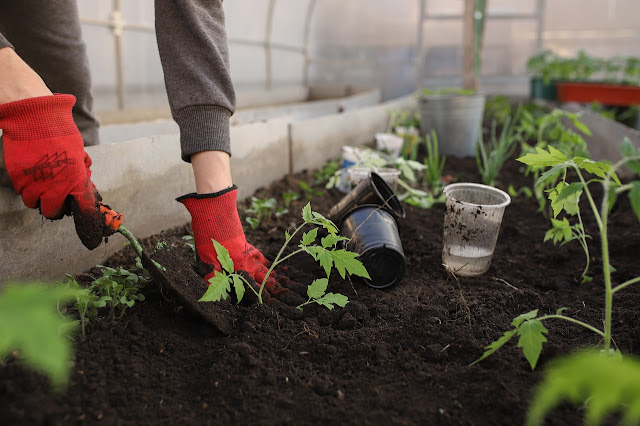 |
| Tomato Plant |
Tomatoes are one of the most popular and widely grown crops worldwide, prized for their delicious taste and versatility in culinary dishes. To achieve healthy and bountiful tomato plants, proper nutrition is vital. In this blog, we will explore the importance of tomato fertilizers, the specific nutrient requirements of tomato plants, different types of fertilizers suitable for tomatoes, and best practices for their application. Whether you're a backyard gardener or a commercial tomato grower, understanding tomato fertilizers is key to maximizing yield and quality.
Understanding Tomato Nutrient Needs:
Tomato plants have specific nutrient requirements for optimal growth and fruit production. Key nutrients include nitrogen (N), phosphorus (P), potassium (K), as well as secondary nutrients and micronutrients. Each nutrient plays a crucial role in different aspects of tomato plant development, such as leaf and stem growth, root development, flowering, and fruit formation.
 |
| Tomato Fertilizer |
Types of Tomato Fertilizers:
a. Complete NPK Fertilizers: These fertilizers provide a balanced mix of nitrogen, phosphorus, and potassium, meeting the primary nutrient needs of tomato plants. They come in various formulations, such as 10-10-10, 19-19-19 or 20-20-20, allowing flexibility in adjusting nutrient ratios based on specific plant requirements.
b. Organic Tomato Fertilizers: Organic options, such as compost, well-rotted manure, and organic blends, provide slow-release nutrients and improve soil health. They enhance nutrient availability, promote microbial activity, and contribute to sustainable gardening practices.
c. Specialty Tomato Fertilizers: Some fertilizers are specifically formulated for tomatoes, catering to their unique nutrient demands. These may contain additional micronutrients like calcium, magnesium, and iron, which are crucial for preventing nutrient deficiencies and common tomato disorders.
Best Practices for Tomato Fertilizer Application:
a. Soil Preparation: Before planting, ensure the soil is well-drained, rich in organic matter, and pH-balanced for optimal nutrient uptake. Conducting a soil test can help identify any deficiencies or imbalances.
b. Pre-Planting Fertilization: Incorporate a balanced fertilizer or compost into the soil before transplanting tomato seedlings. This provides a nutrient reserve for the developing plants.
c. Side-Dressing: As tomato plants grow, side-dressing with a nitrogen-rich fertilizer can help sustain their nutrient needs throughout the growing season. Apply the fertilizer a few inches away from the plant stem to avoid burning the roots.
d. Foliar Feeding: Spraying a water-soluble fertilizer directly on the tomato leaves can provide a quick nutrient boost, especially if deficiencies are observed. Foliar feeding is beneficial during periods of high nutrient demand or when soil uptake is limited.
e. Regular Monitoring: Monitor plant health, growth, and any signs of nutrient deficiencies. Adjust fertilizer application based on plant requirements and response.
Additional Tomato Plant Care:
a. Watering: Consistent and adequate watering is crucial for tomato plants, as water stress can affect nutrient uptake and lead to blossom-end rot. Provide deep watering, ensuring the soil is evenly moist but not waterlogged.
b. Mulching: Mulching around tomato plants helps conserve soil moisture, regulate temperature, and suppress weed growth. Organic mulches also contribute to soil fertility as they decompose.
c. Pruning and Support: Proper pruning and providing support, such as cages or stakes, promote air circulation, reduce disease risk, and enhance fruit production.
Conclusion:
Proper fertilization is essential for the successful growth and abundant harvest of tomato plants. Understanding the specific nutrient requirements of tomatoes and selecting suitable fertilizers can optimize plant health, vigor, and fruit quality. By following best practices in fertilizer application, soil preparation, and overall plant care, gardeners and growers can enjoy a productive tomato season and relish the delicious rewards of their labour.
Thanks for visiting us.
#tomatofertilizers #tomatoplantcare #plantnutrition #organicgardening #NPKfertilizers #soilpreparation #fertilizerapplication #tomatogrowing #gardeningtips #plantcare #tomatoharvest #sustainablegardening #tomatoplantnutrition #growingtomatoes #gardeningadvice #plantnutrition #tomatoyield #homegardening #gardeningcommunity #growyourownfood #vegetablegardening #planthealth #soilfertility #tomatocultivation #agriculture #horticulture


No comments:
Post a Comment